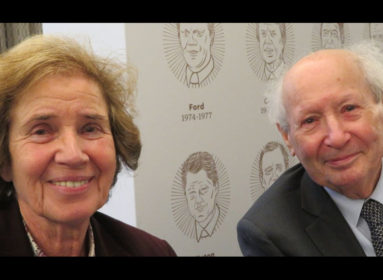By Rafael Medoff
Is President Obama ‘s new human rights policy “If we can’t save everybody, then we shouldn’t save anybody”…?
That’s the unfortunate impression the president left with his startling comments about human rights abroad, in an interview he gave on, ironically, International Holocaust Remembrance Day (Jan. 27).
Asked by an interviewer from The New Republic about his reluctance to intervene against the Syrian government’s mass killing of its citizens, President Obama replied: “How do I weigh tens of thousands who’ve been killed in Syria versus the tens of thousands who are currently being killed in the Congo?”
The implication of the president’s remark is that since there are so many human rights crises around the world, and the United States cannot address them all, therefore we should not address any of them. That’s wrong. The fact that innocent people are being killed in the Congo is not a reason for the Obama administration to refrain from aiding innocent people who are being killed in Syria. One does not have to “weigh” one against the other. The United States is strong enough, and resourceful enough, to provide some kind of assistance in more than one place at a time.
The president made his remark on International Holocaust Remembrance Day (commemorated by the United Nations on January 27, the anniversary of the liberation of Auschwitz). Perhaps, then, it is worth recalling that President Franklin D. Roosevelt and his administration responded to the Holocaust by making that same tragic argument—since they could not stop the entire Holocaust, there was no point in trying to do anything at all.
On March 27, 1943, at the height of the Nazi genocide, British Foreign Secretary Anthony Eden met at the White House with President Roosevelt, Secretary of State Cordell Hull, and several other American and British officials. One of the topics that came up for discussion was the possibility of rescuing 60,00-70,000 Jews from Bulgaria. Eden objected to the Allies acting “to take all Jews out of a country like Bulgaria,” because “if we do that, then the Jews of the world will be wanting us to make similar offers in Poland and Germany. Hitler might well take us up on such an offer, and there simply are not enough ships and means of transportation in the world to handle them.”
Neither FDR nor any of the other participants in the meeting disagreed with Eden’s argument. Nobody asked, Why not save at least some of them, if we can’t save them all? Why not use at least a few ships? After all, U.S. troop supply ships that went to Europe routinely returned to America empty; in fact, they to be loaded down with ballast lest they capsize because they were so light. Or why not arrange with the Bulgarians to let the Jews walk out, if necessary, across the Balkans and out through neutral Turkey? Undoubtedly the Jews would have gladly done even that, to escape the Nazis. No, here was the Allies’ response to the Holocaust in a nutshell: since we can’t rescue all the Jews in Europe, we shouldn’t bother trying to rescue any of them.
A tragic footnote: Prof. David S. Wyman points out that “ten days after Eden’s discussion with Roosevelt and the other statesmen, the British government announced plans to take 21,000 non-Jewish Polish refugees to East Africa. They were some of the 100,000 non-Jewish Polish, Yugoslavian, and Greek refugees whom the Allies moved to sanctuaries in the Middle East and Africa during World War II.” And as Prof. Monty N. Penkower has noted, the British even managed to find ships to take 20,000 Muslims from Egypt to Mecca for their religious pilgrimage, in the middle of the war.
What the United States should, or can, do in Syria and the Congo today “are not simple questions,” President Obama emphasized in his interview on International Holocaust Remembrance Day. But just because they are not simple questions does not mean the United States is unable to provide any answers at all.
There many steps short of all-out war that the Obama administration could take. Let’s start with the most basic: give the U.S. government’s Atrocities Prevention Board a sufficient budget and other resources to do the job it was created to do. Nine months after President Obama established the Board, it still has no office, phone number, or web site. Of course the Board cannot stop every atrocity in Syria or the Congo. But that doesn’t mean it shouldn’t be given the tools to try and stop at least some of them.
Dr. Rafael Medoff is director of The David S. Wyman Institute for Holocaust Studies, www.WymanInstitute.org.








 Southern New England Jewish Ledger
Southern New England Jewish Ledger












